Nurses Narratives: Sister G E Davis
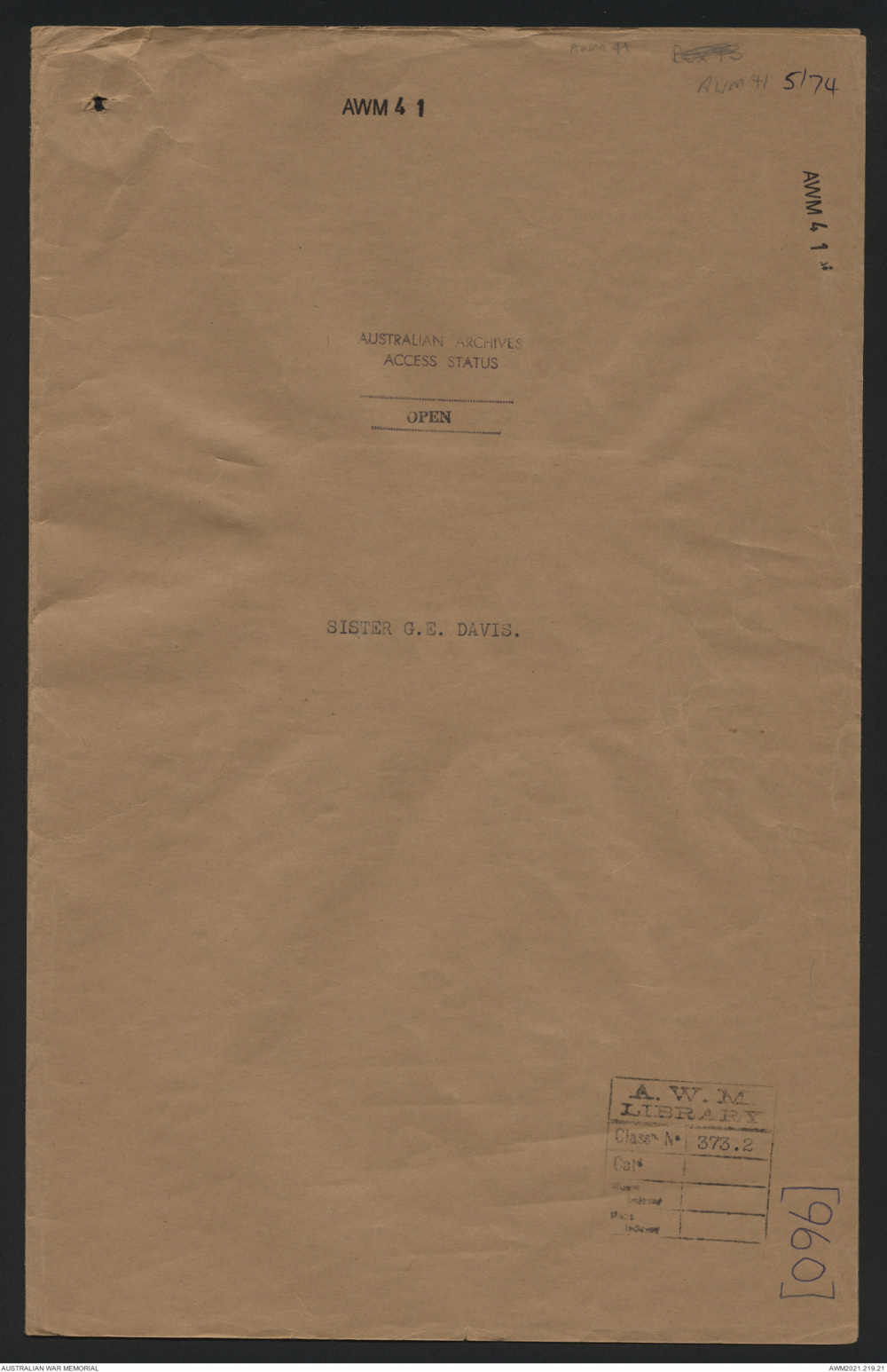
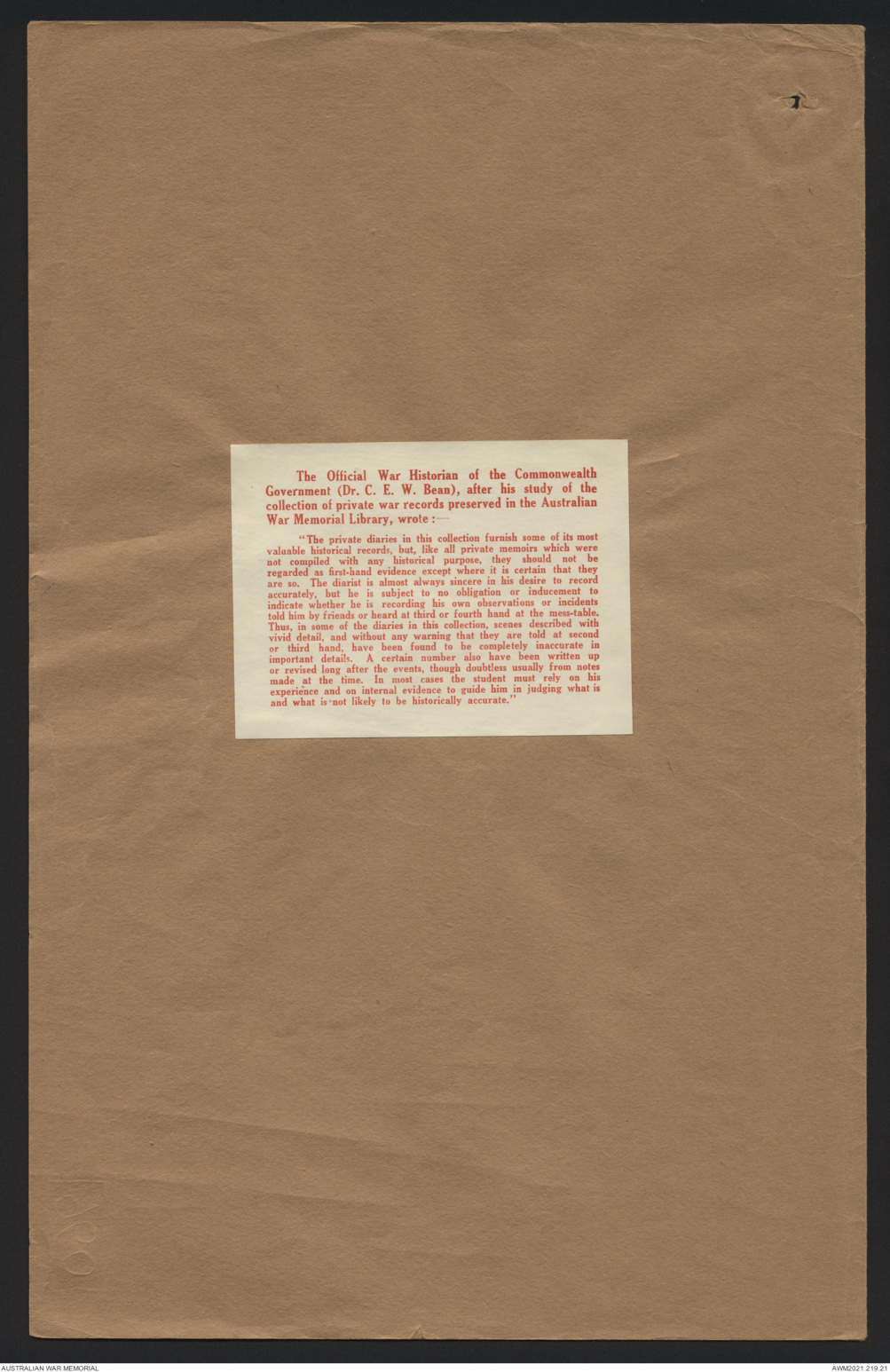
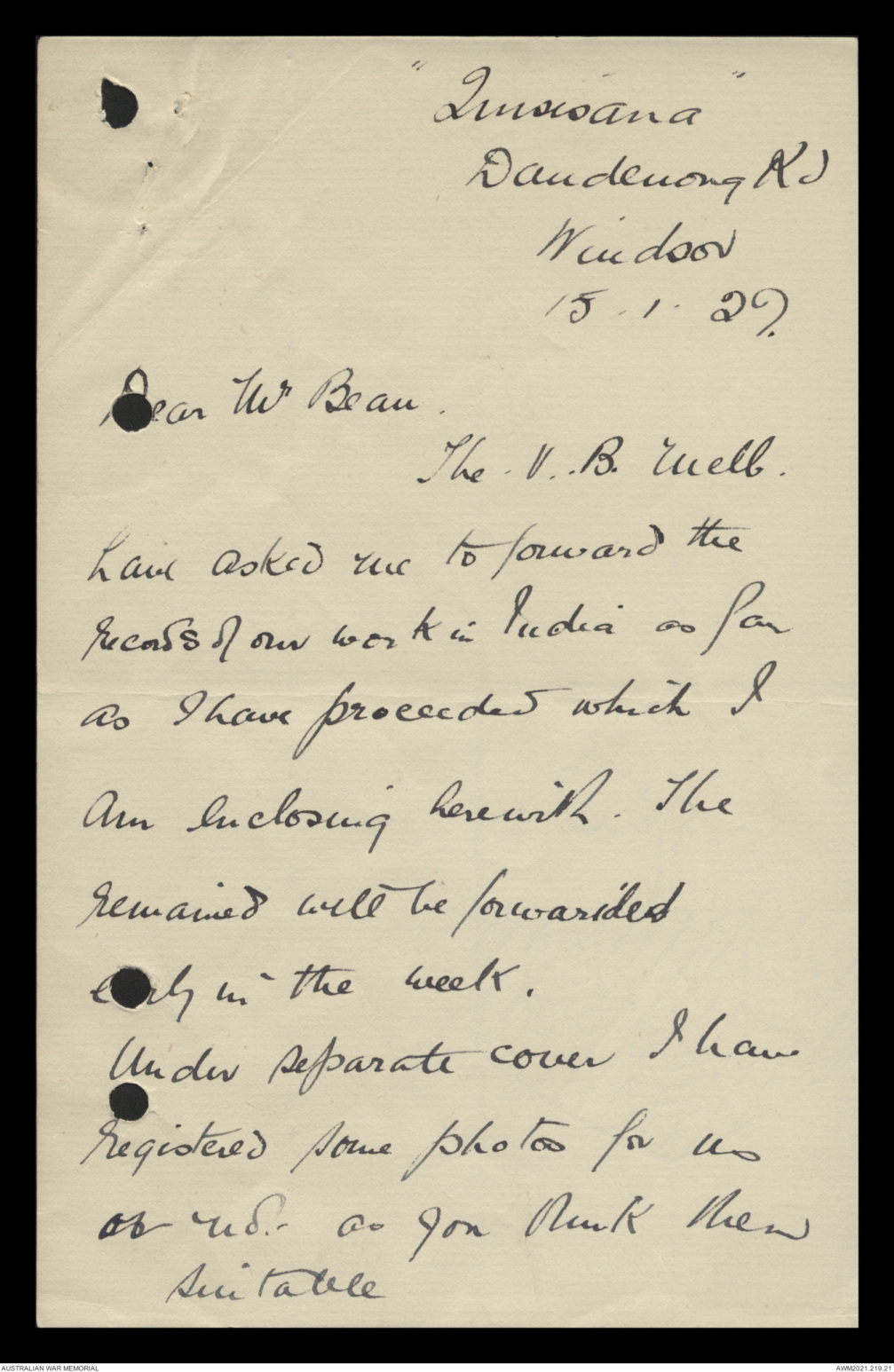
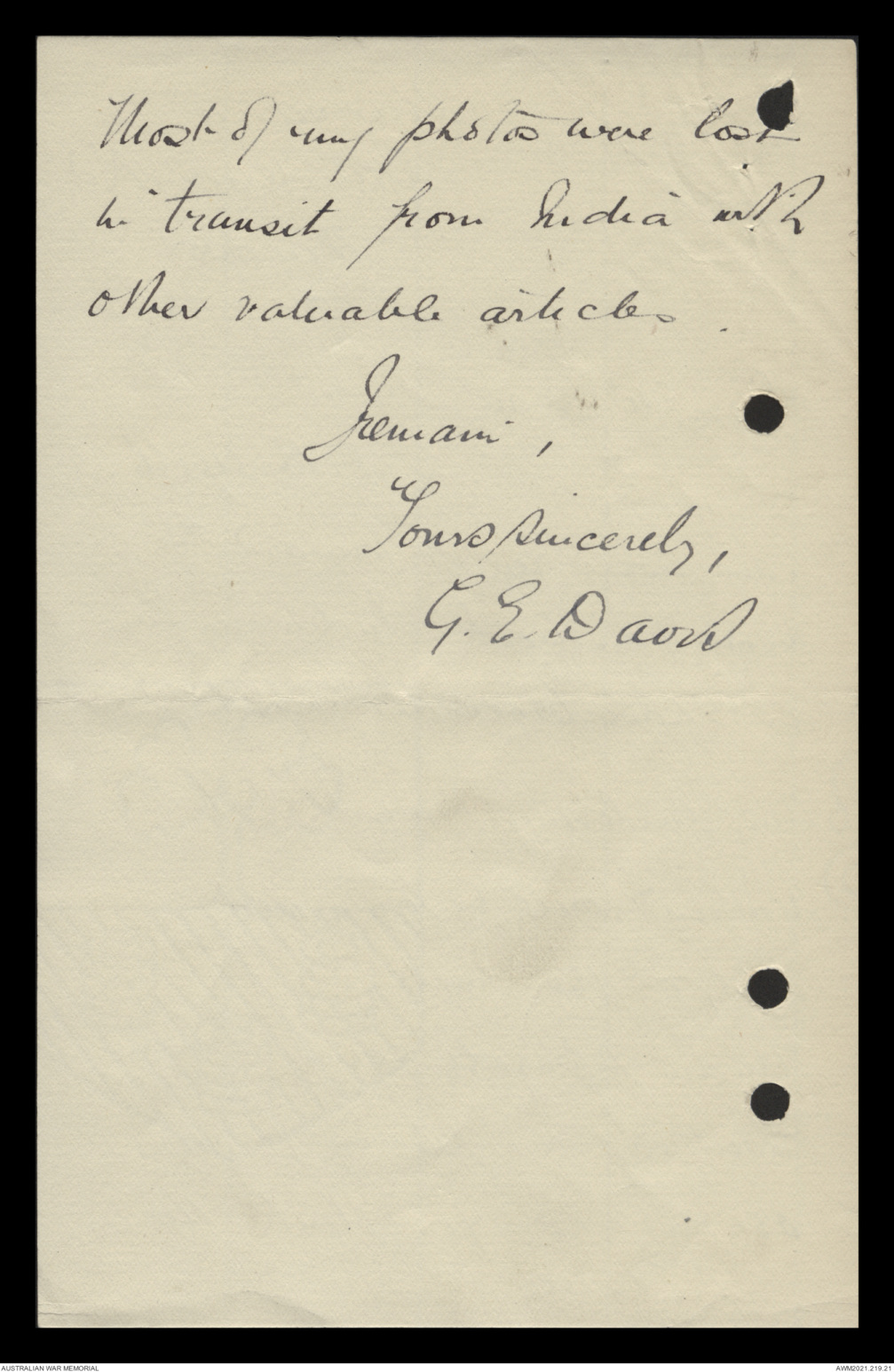
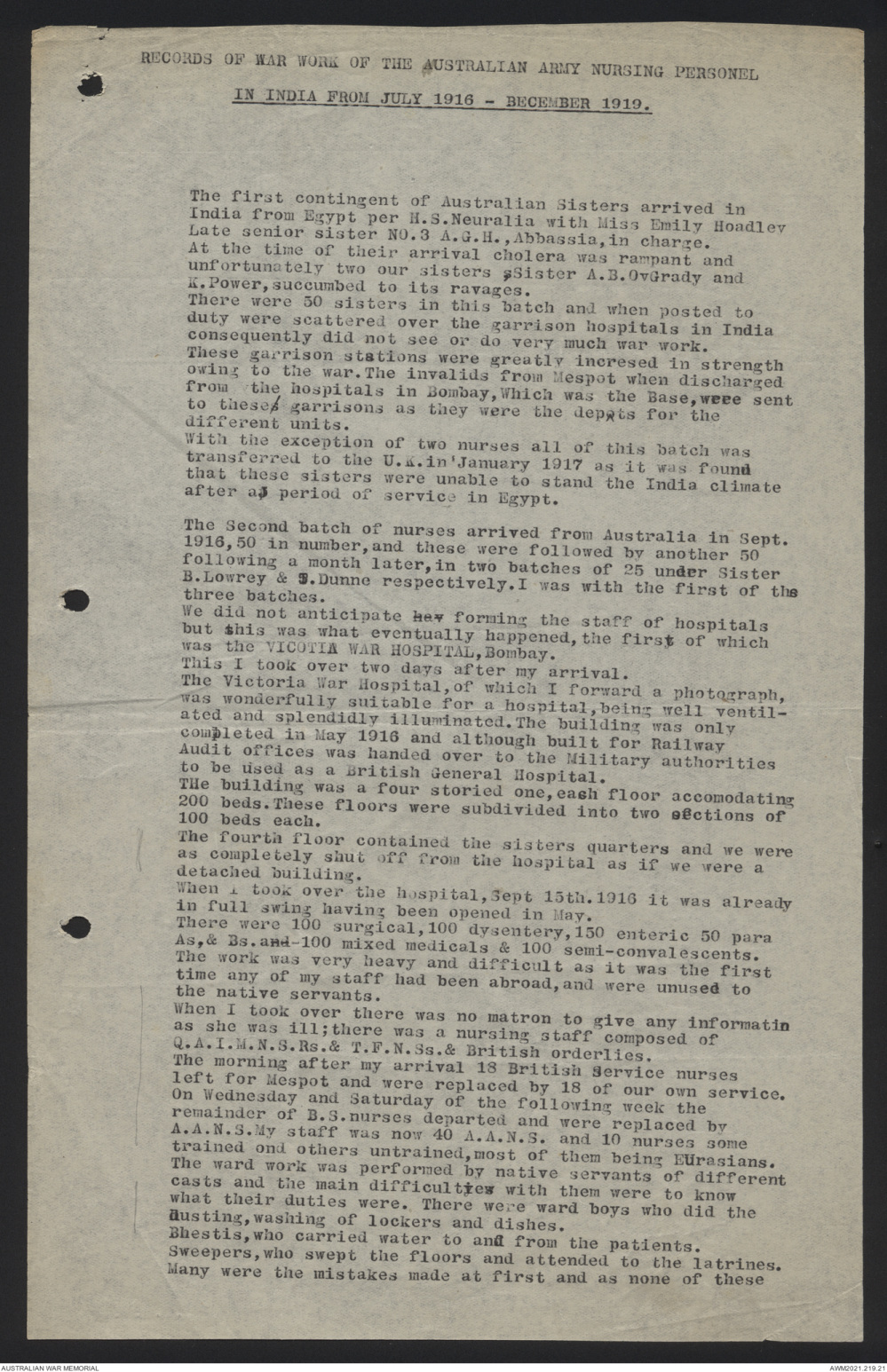
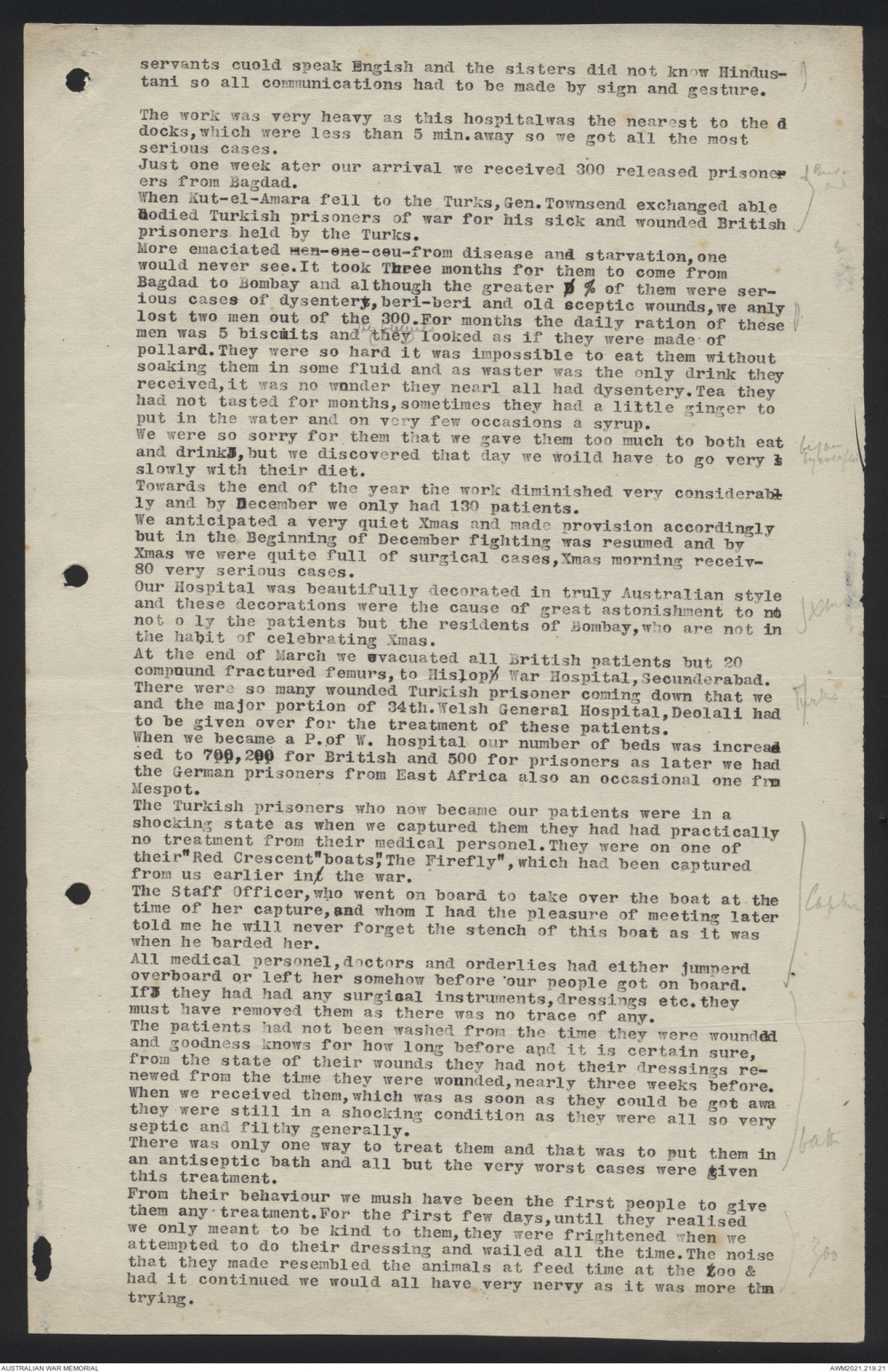
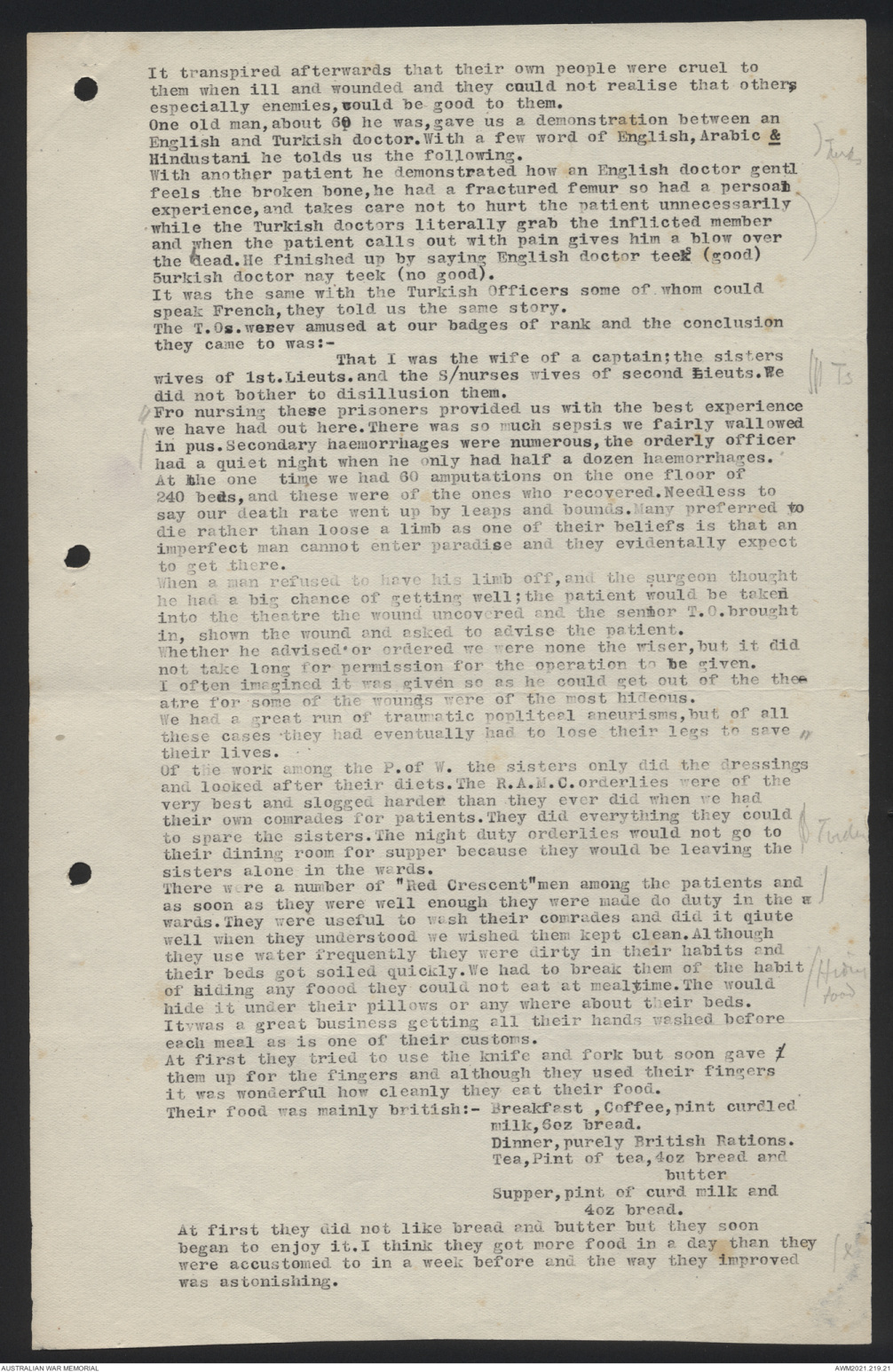
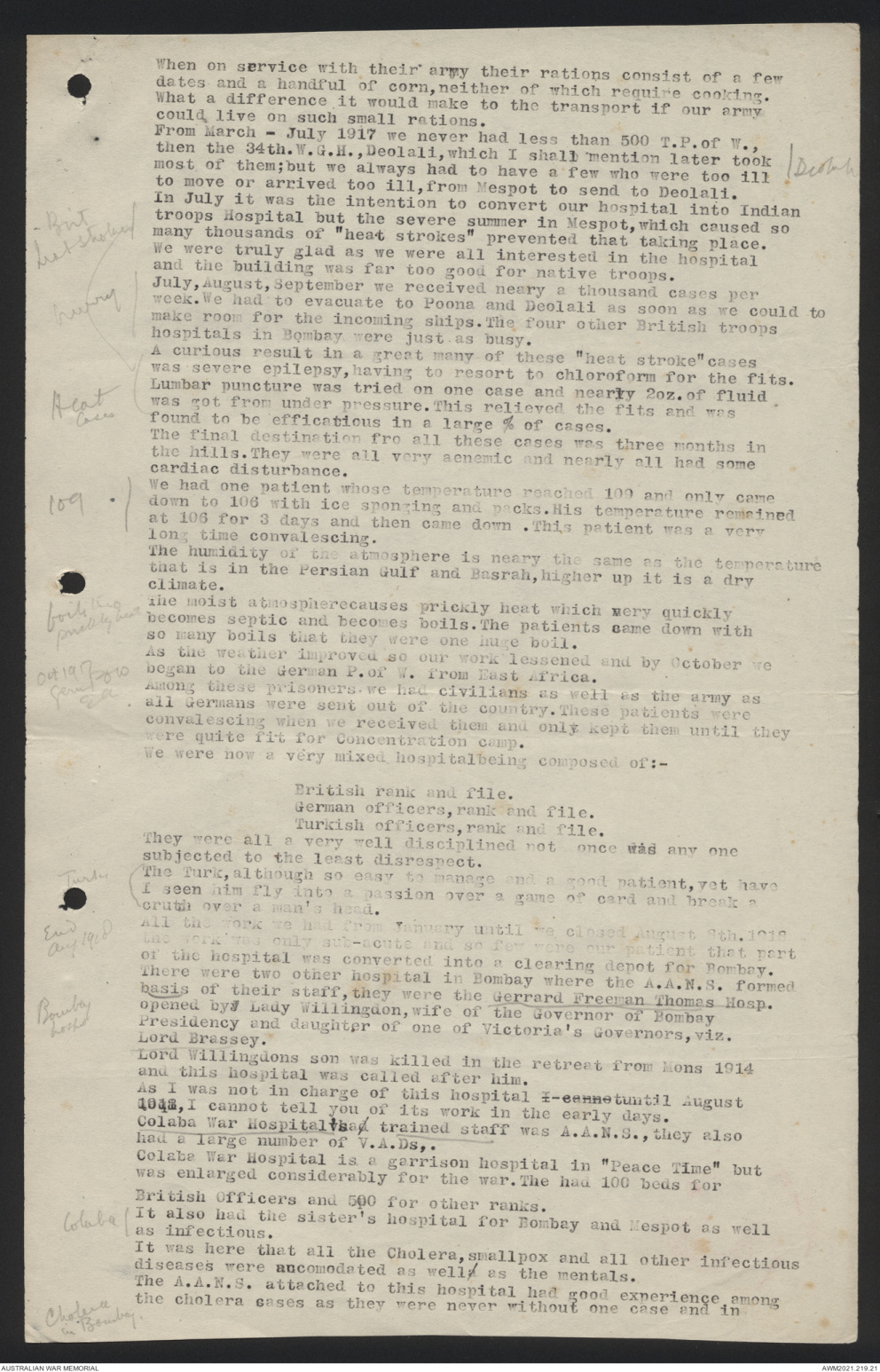
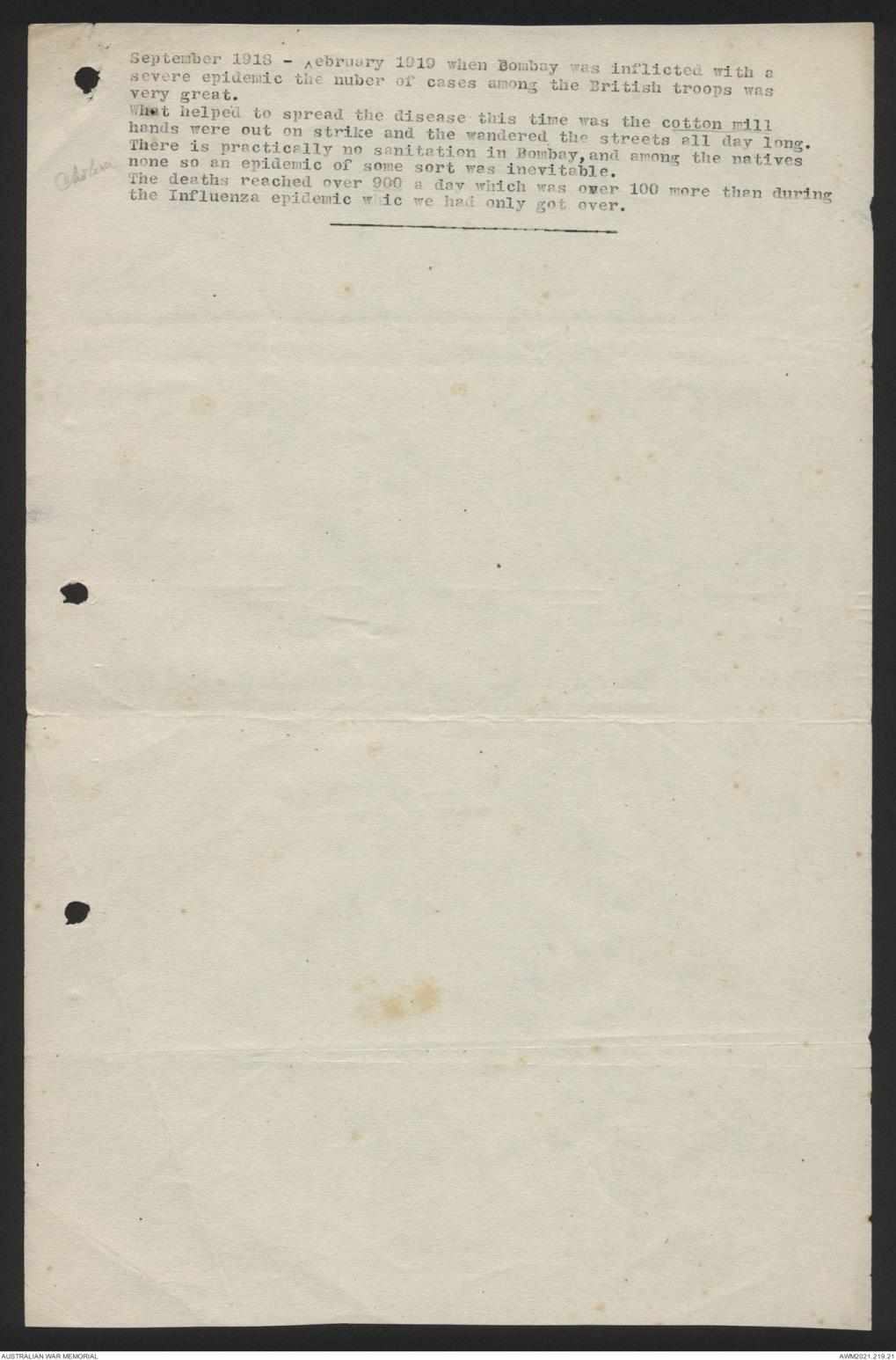
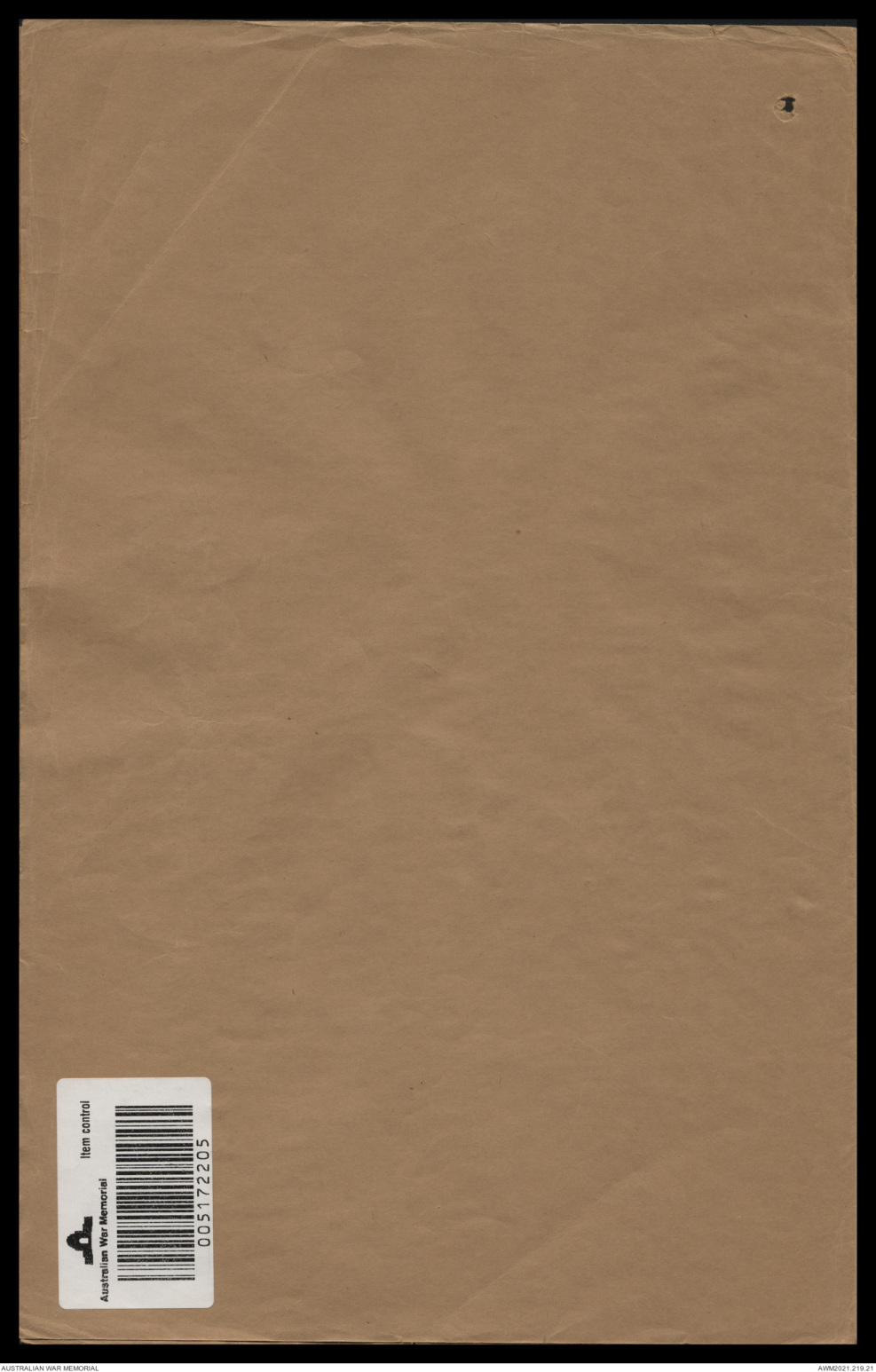
AWM 4 1
AUSTRALIAN ARCHIVES
ACCESS STATUS
OPEN
SISTER G. E. DAVIS.
[960]
The Offical War Historian of the Commonwealth
Government (Dr. C. E. W. Bean), after his study of the
collection of private war records preserved in the Australian
War Memorial Library, wrote:-
"The private diaries in this collection furnish some of its most
valuable historical records, but, like all private memoirs which were
not compiled with any historical purpose, they should not be
regarded as first-hand evidence except where it is certain that they
are so. The diarist is almost always sincere in his desire to record
accurately, but he is subject to no obligation or inducement to
indicate whether he is recording his own observations or incidents
told him by friends or heard at third or fourth hand at the mess-table.
Thus, in some of the diaries in this collection, scenes described with
vivid detail, and without any warning that they are told at second
or third hand, have been found to be completely inaccurate in
important details. A certain number also have been written up
or revised long after the events, though doubtless usually from notes
made at the time. In most cases the student must rely on his
experience and on internal evidence to guide him in judging what is
and what is not likely to be historically accurate".
"Imsusana"
Dandenong Rd
Windsor
15.1.27
Dear Mr Bean
The V. B. Melb.
Have asked me to forward the
events of our work in India so far
so I have proceeded which I
am enclosing herewith. The
remainder will be forwarded
early in the week.
Under separate cover I have
registered some photos for us
or you as you think them
suitable
Most of my photos were lost
in transit from India with
other valuable articles.
Remain,
Yours sincerely,
G.E.Davis
RECORDS OR WAR WORK OF THE AUSTRALIAN ARMY NURSING PERSONEL
IN INDIA FROM JULY 1916-BECEMBER 1919.
The first contingent of Australian Sisters arrived in
India from Egypt per H.S. Neuralia with Miss Emily Hoadley
Late senior sister No. 3 A.G.H., Abbassia, in charge.
At the time of their arrival cholera was rampant and
unfortunately two our sisters Sister A.B.OvGrady and
K. Power, succumbed to its ravages.
There were 50 sisters in this batch and when posted to
duty were scattered over the garrison hospitals in India
consequently did not see or do very much war work.
These garrison stations were greatly increased in strength
owing to the war. The invalids from Mespot when discharged
from the hospitals in Bombay, Which was the Base, were sent
to theses garrisons as they were the depots for the
different units.
With the exception of two nurses all of this batch was
transferred to the U.K. in ‘January 1917 as it was found
that these sisters were unable to stand the India climate
after a period of service in Egypt.
The second batch of nurses arrived from Australia in Sept.
1916, 50 in number, and these were followed by another 50
following a month later, in two batches of 25 under Sister
B. Lowrey & S. Dunne respectively. I was with the first of the
three batches.
We did not anticipate hav forming the staff of hospitals
but this was what eventually happened, the first of which
was the VICOTIA WAR HOSPITAL, Bombay.
This I took over two days after my arrival.
The Victoria War Hospital, of which I forward a photograph,
was wonderfully suitable for a hospital, being well ventil-
ated and splendidly illuminated. The building was only
completed in May 1916 and although built for Railway
Audit offices was handed over to the Military authorities
to be used as a British General Hospital.
THe building was a four storied one, each floor accomodating
200 beds. These floors were subdivided into two sections of
100 beds each.
The fourth floor contained the sisters quarters and we were
as completely shut off from the hospital as if we were a
detached building.
When I took over the hospital, Sept. 15th. 1916 it was already
in full swing having been opened in May.
There were 100 surgical, 100 dysentery, 150 enteric 50 para
As, & Bs. and -100 mixed medicals & 100 semi-convalescents.
The work was very heavy and difficult as it was the first
time any of my staff had been abroad, and were unused to
the native servants.
When I took over there was no matron to give any informatin
as she was ill; there was a nursing staff composed of
Q.A.I.M.N.S. Rs. & T.F.N.Ss. & British orderlies.
The morning after my arrival 18 British Service nurses
left for Mespot and were replaced by 18 of our own service.
On Wednesday and Saturday of the following week the
remainder of B.S. nurses departed and were replaced by
A.A.N.S. My staff was now 40 A.A.N.S. and 10 nurses some
trained and others untrained, most of them being EUrasians.
The ward work was performed by native servants of different
casts and the main difficulties with them were to know
what their duties were. There were ward boys who did the
dusting, washing of lockers and dishes.
Bhestis, who carried water to and from the patients.
Sweepers, who swept the floors and attended to the latrines.
Many were the mistakes made at first and as none of these
servants could speak English and the sisters did not know Hindus-
tani so all communications had to be made by sign and gesture.
The work was very heavy as this hospitalwas the nearest to the d
docks, which were less than 5 min.away so we got all the most
serious cases.
Just one week ater our arrival we received 300 released prisoner
ers from Bagdad.
When Kut-el-Amara fell to the Turks, Gen. Townsend exchanged able
bodied Turkish prisoners of war for his sick and wounded British
prisoners held by the Turks.
More emaciated men-ene-ceu-from disease and starvation, one
would never see. It took Three months for them to come from
Bagdad to Bombay and although the greater D % of them were ser-
ious cases of dysentery, beri-beri and old sceptic wounds, we anly
lost two men out of the 300. For months the daily ration of these
men was 5 biscuits and they looked as if they were made of
pollard. They were so hard it was impossible to eat them without
soaking them in some fluid and as water was the only drink they
received, it was no wonder they nearl all had dysentery. Tea they
had not tasted for months, sometimes they had a little ginger to
put in the water and on very few occasions a syrup.
We were so sorry for them that we gave them too much to both eat
and drink, but we discovered that day we woild have to go very
slowly with their diet.
Towards the end of the year the work diminished very considerab-
ly and by December we only had 130 patients.
We anticipated a very quiet Xmas and made provisions accordingly
but in the Beginning of December fighting was resumed and by
Xmas we were quite full of surgical cases, Xmas morning receiv-
80 very serious cases.
Our hospital was beautifully decorated in truly Australian style
and these decorations were the cause of great astonishment to
not only the patients but the residents of Bombay, who are not in
the habit of celebrating Xmas.
At the end of March we evacuated all British patients but 20
compound fractured femurs, to Hislop War Hospital, Secunderabad.
There were so many wounded Turkish prisoner coming down that we
and the major portion of 34th. Welsh General Hospital, Deolali had
to be given over for the treatment of these patients.
When we became a P. of W. hospital our number of beds was increa-
sed to 700, 200 for British and 500 for prisoners as later we had
the German prisoners from East Africa also on accasional one frm
Mespot.
The Turkish prisoners who now became our patients were in a
shocking state as when we captured them they had had practically
no treatment from their medical personel. They were on one of
their "Red Crescent" boats", The Firefly", which had been captured
from us earlier int the war.
The Staff Officer, who went on board to take over the boat at the
time of her capture, and whom I had the pleasure of meeting later
told me he will never forget the stench of this boat as it was
when he barded her.
All medical personel, doctors and orderlies had either jumperd
overboard or left her somehow before our people got on board.
If they had had any surgical instruments, dressings etc. they
must have removed them as there was no trace of any.
The patients had not been washed from the time they were wounded
and goodness knows for how long before and it is certain sure,
from the state of their wounds they had not their dressings re-
newed from the time they were wounded, nearly three weeks before.
When we received them, which was as soon as they could be got awa
they were still in a shocking condition as they were all so very
septic and filthy generally.
There was only one way to treat them and that was to put them in
an antiseptic bath and all but the very worst cases were given
this treatment.
From their behaviour we mush have been the first people to give
them any treatment. For the first days, until they realised
we only meant to be kind to them, they were frightened when we
attempted to do their dressing and wailed all the time. The noise
that they made resembled the animals at feed time at the zoo &
had it continued we would all have very nervy as it was more thn
trying.
It transpired afterwards that their own people were cruel to
them when ill and wounded and they could not realise that others
especially enemies, would be good to them.
One old man, about 60 he was, gave us a demonstration between an
English and Turkish doctor. With a few word of English, Arabic &
Hindustani he tolds us the following.
With another patient he demonstrated how an English doctor gentl
feels the broken bone, he had a fractured femur so had a personal
experience, and takes care not to hurt the patient unnecessarily
while the Turkish doctors literally grab the inflicted member
and when the patient calls out with pain gives him a blow over
the head. He finished up by saying English doctor teek (good)
Turkish doctor nay teek (no good).
It was the same with the Turkish Officers some of whom could
speak French, they told us the same story.
The T.Os. werev amused at our badges of rank and the conclusion
they came to was:-
That I was the wife of a captain; the sisters
wives of 1st. Lieuts. and the S/nurses wives of second Lieuts.We
did not bother to disillusion them.
Fro nursing these prisoners provided us with the best experience
we have had out there. There was so much sepsis we fairly wallowed
in pus. Secondary haemorrhages were numerous, the orderly officer
had a quiet night when he ony had half a dozen haemorrhages.
At the one time we had 60 amputations on the one floor of
240 beds, and these were of the ones who recovered. Needless to
say our death rate went up by leaps and bounds. Many preferred to
die rather than loose a limb as one of their beliefs is that an
imperfect man cannot enter paradise and they evidently expect
to get there.
When a man refused to have his limb off, and the surgeon thought
he had a big chance of getting well; the patient would be taken
into the theatre the wound uncovered and the senior T.O. brought
in, shown the wound and asked to advise the patient.
Whether he advised or ordered we were none the wiser, but it did
not take long fr permission for the operation to be given.
I often imagined it was given so as he could get out the the
atre for some of the wounds were of the most hideous.
We had a great run of traumatic popilteal aneurisms, but of all
these cases they had eventualy had to lose their legs to save
their lives.
Of the work among the P. of W. the sisters only did the dressings
and looked after their diets. The R.A.M.C. orderlies were of the
very best and slogged harder than they ever did when we had
their own comrades for patients. They did everything they could
to spare the sisters. The night duty orderlies would not go to
their dining room for supper because they would be leaving the
sisters alone in the wards.
There were a number of "Red Crescent" men among the patients and
as soon as they were well enough they were made do duty in the
wards. They were useful to wash their comrades and did it qiute
well when they understood we wished them kept clean. Although
they use water frequently they were dirty in their habits and
their beds got soiled quickly. We had to break them of the habit
of hiding any food they could not eat at mealtime. The would
hide it under their pillows or any where about their beds.
It was a great business getting all their hands washed before
each meal as is one of their customs.
At first they tried to use the knife and fork but soon gave
them up for the fingers and although they used their fingers
it was wonderful how cleanly they eat their food.
Their food was mainly british:- Breakfast, Coffee, pint curdled
milk, 6oz bread.
Dinner, purely British Rations.
Tea, Pint of tea, 4oz bread and
butter
Sipper, pint of curd milk and
4oz bread.
At first they did not like bread and butter but they soon
began to enjoy it. I think they got more food in a day then they
were accustomed to in the week before and the way they improved
was astonishing.
When on service with their army their rations consist of a few
dates and a handful of corn, neither of which require cooking.
What a difference it would make to the transport if our army
could live on such small rations.
From March-July 1917 we never had less than 500 T.P. of W.,
then the 34th. W.G.H., Deolali, which I shall mention later took
most of them; but we always had to have a few who were too ill
to move or arrive too ill, from Mespot to send to Deolali.
In July it was the intention to convert our hospital into Indian
troops Hospital but the severe summer in Mespot, which caused so
many thousands of "heat strokes" prevented that taking place.
We were truly glad as we were all interested in the hospital
and the building was far too good for native troops.
July, August, September we received nearly a thousand cases per
week. We had to evacuate to Poona and Deolali as soon as we could to
make room for the incoming ships. The four other British troops
hospitals in Bombay were just as busy.
A curious result in a great many of these "heat strokes" cases
was severe epilepsy, having to resort to chloroform for the fits.
Lumbar puncture was tried on one case and nearly 2oz. of fluid
was got from under pressure. This relieved the fits and was
found to be efficatious in a large % of cases.
The final destination fro all these cases was three months in
the hills. They were all very aenemic and nearly all had some
cardiac disturbance.
We had one patient whose temperature reached 109 and only came
down to 106 with ice sponging and packs. His temperature remained
at 106 for 3 days and then came down. This patient was a very
long time convalescing.
The humidity of the atmosphere is nearly the same as the temperature
that is in the Persian Gulf ad Basrah, higher up it is a dry
climate.
The most atmospherecauses prickly heat which very quickly
becomes septic and becomes boils. The patients came down with
so many boils that they were one huge boil.
As the weather improved so our work lessened and by October we
began to the German P. of W. from East Africa.
Among these prisoners we had civilians as well as the army as
all Germans were sent out of the country. These patients were
convalescing when we received them and only kept them until they
were quite fit for Concentration Camp.
We were now a very mixed hospitalbeing composed of :-
British rank and file.
German officers, rank and file.
Turkish officers, rank and file.
They were all very well disciplined not once was any one
subjected to the least disrespect.
The Turk, although so easy to manage and a good patient, yet have
I seen him fly into a passion over a game of card and break a
crutch over a man's head.
All the work we had from January until we closed, August 8th, 1918
the work was only sub-acute and so few were out patient that part
of the hospital was converted into a clearing depot for Bombay.
There were two other hospital in Bombay where the A.A.N.S. formed
basis of their staff, they were the Gerrard Freeman Thomas Hosp.
opened by Lady Willingdon, wife of the Governor of Bombay
Presidency and daughter of one of Victoria's Governors, viz.
Lord Brassey.
Lord Willingdons son was killed in the retreat from Mons 1914
and this hospital was called after him.
As I was not in charge of this hospital until August
[1916?]], I cannot tell you of its work in the early days.
Colaba War Hospital trained staff was A.A.N.S., they also
had a large number of V.A.Ds,.
Colaba War Hospital is a garrison hospital in "Peace Time" but
was enlarged considerably for the war. The had 100 beds for
British Officers and 500 for other ranks.
It also had the sister's hospital for Bombay and Mespot as well
as infectious.
It was here that all the Cholera, smallpox and all other infectious
diseases were accommodated as well as the mentals.
The A.A.N.S. attached to this hospital had good experience among
the cholera cases as they were never without one case and in
September 1918-February 1919 when Bombay was inflicted with a
severe epidemic the nuber of cases among the British troops was
very great.
What helped to spread the disease this time was the cotton mill
hands were out on strike and the wandered the streets all day long
There is practically no sanitation in Bombay, and among the natives
none so an epidemic of some sort was inevitable.
The deaths reached over 900 a day which was over 100 more than during
the Influenza epidemic whic we had only got over.
 Jacqueline Kennedy
Jacqueline KennedyThis transcription item is now locked to you for editing. To release the lock either Save your changes or Cancel.
This lock will be automatically released after 60 minutes of inactivity.